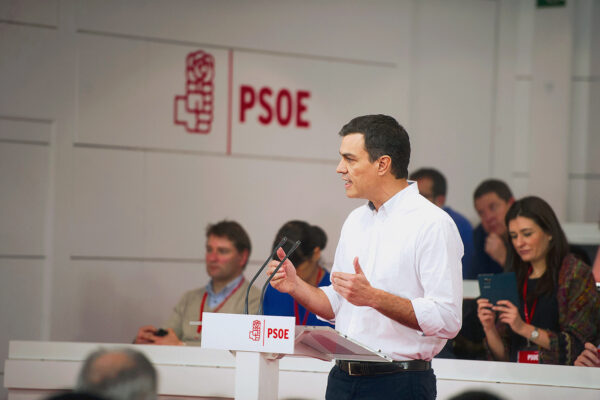
Spanish prime minister Pedro Sánchez needs to make good on his promise to open dialogue with the Catalan regional government.
Talks about more autonomy were put on hold when the COVID-19 pandemic reached Spain in March. Now that it looks like the country will have to live with coronavirus for many more months, Sánchez cannot delay indefinitely.
Catalonia is due to hold elections before the end of the year. If the Republican Left, the more moderate of the separatist parties, doesn’t have anything to show for bringing Sánchez, a fellow social democrat, to power in Madrid, hardliners could win in Barcelona and make a negotiated solution even more elusive.
Falling out
The Republican Left is the second party in the Catalan government, after the center-right and less compromising Together for Catalonia.
Polls still put the Republican Left in first place, but only just. Its support has fallen from a high of 28 percent in one poll in February to 22-23 percent in recent surveys. Together for Catalonia is up, from a low of 15 to 19-20 percent.
Support for the far-left Popular Unity Candidacy (CUP), the third separatist party, is stable at 5-6 percent.
The parties have fallen out over a legal dispute. When the electoral commission ruled that Quim Torra, the regional president and Together for Catalonia leader, had violated the election law by hanging a partisan banner from the balcony of his palace in Barcelona, the Republican Left agreed to enforce its decision and strip Torra of his status as lawmaker. Torra didn’t recognize the commission’s ruling and remains president.
The banner called for the release of nine separatists who were imprisoned in 2019 for leading a failed independence bid two years earlier. Among them is the Republican Left party leader, Oriol Junqueras.
Benefit of the doubt
Sánchez, breaking with the wait-and-see approach of his conservative predecessor, Mariano Rajoy, recognized that the separatist crisis in Catalonia demands a political, not a legal, solution.
He agreed to talks about transferring more power to the region, but not a legal independence referendum, the other key separatist demand.
The Republican Left gave Sánchez the benefit of the doubt and abstained from his investiture in January, giving the Socialist, whose own party doesn’t have a majority in Congress, just enough votes to scrape by.
Together for Catalonia and CUP voted against him.
Vicious cycle
Sánchez risks disappointing moderate Catalans, who can neither accept the status quo nor want to break away from Spain unilaterally, if at all.
Sánchez gave them nothing during his first term (2018-19). His predecessor, Rajoy, ignored the pleas of centrist Catalan leaders for more self-government during the previous economic crisis, when the independence movement gained popularity and power.
When the separatists, after years of hearing only “no” from Madrid, held an independence referendum in 2017 that had been forbidden by the Constitutional Court, Rajoy revoked Catalonia’s autonomy, sent in riot police and prosecuted separatist leaders, including members of the Catalan government.
This approach radicalized Catalan attitudes. Residents of the region increasingly identify as exclusively Catalan or Spanish. Those identifies used to overlap. Separatists used to reject violence. Now a majority thinks it will be needed to bring about an independent republic.
Opposition to Catalan nationalism has hardened in the rest of Spain. A new far-right party, Vox (Voice), wants to cancel Catalonia’s autonomy. The mainstream right is in favor of suspending it. Sánchez has been called a traitor for merely promising talks with the Catalans, not even holding any, let alone making concessions.
This vicious cycle needs to be broken.
I still believe there is a third way: more self-government for Catalonia, ideally within a federal Spain, that is put to Catalan voters in a referendum similar to the 2006 vote on autonomy.
But time for such a compromise is running out.
